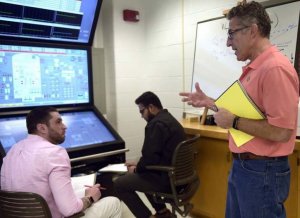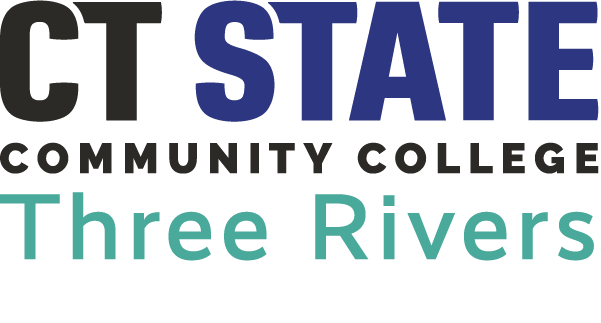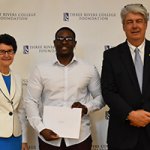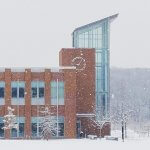In the News | At Three Rivers, nuclear simulator with new tech offers unique learning experience
Norwich, CT (The Day, February 29, 2020) — Joe Amarello began the nuclear simulator laboratory class Thursday afternoon at Three Rivers Community College by explaining to his students that the nuclear reactor was at 5% power.
The students had been operating the simulator at 100% power for the past month, so this was new for them. It was also the first time they were operating the main turbine.
Blake Brochu and Corey Levesque worked as a team at one of the large screens while Joseph Whitmore and Faysal Prodhan sat on their right in front of a second screen; the lab is capped at four students per class, and so there is more than one class.
To an outsider, the screen looks like an impossible-to-follow flowchart made up of green triangles and circles, inscrutable acronyms and fluorescent green levels that are measuring … something.
But for the four students, who are all in the second year of the nuclear engineering technology program at Three Rivers and on track to graduate in May, it’s very helpful.
The simulator “gives you a little insight on how it’s an engineering marvel,” Whitmore said of nuclear reactors. Brochu chimed in with a smile, “Plus, if we do something wrong, it’s not awful.”

Adjunct faculty member Joe Amarello, right, works with students Joseph Whitmore, left and Faysal Prodham during a nuclear simulator laboratory on Thursday, Feb. 27,2020, at Three Rivers Community College. (Sarah Gordon/The Day)
Program coordinator Jim Sherrard said Three Rivers has a nuclear simulator, rather than the actual reactor a 4-year nuclear program would have, because it’s more affordable and doesn’t come with the security risks.
But it also has the benefit of allowing instructors to program in problems for students to handle, whether it’s a leak or a valve failure or a problem with the cooling system from Long Island Sound.
“With a simulator training environment, you can actually do things to the power plant that you could not do at a real power plant,” Amarello said. For example, he could simulate that one of the cooling pumps is going to fail, or two. If all three fail, he said, the reactor is going to “trip” faster, meaning the reactor will shut down for safety reasons. And then the alarms go off.
“We call this the ultimate what-if machine,” Sherrard said.
And now, he said, the nuclear engineering technology program at Three Rivers is the only place in the world with a certain kind of new hardware and software.
“The modeling is a little more robust, a little cleaner, a little more responsive,” Amarello said.
Sherrard added that the new technology is faster and more accurate. He said it came from the Maryland-based simulation technology company Western Services Corp., was installed in December and January, and cost about $50,000.
The hardware and software operate on a simulator that is six or seven years old and that Western Services also developed for Three Rivers, Sherrard said. Before that, students had been using the same analog simulator since 1990, and it met their needs but he couldn’t find parts for it anymore.
This associate degree program is the only one of its kind in New England and one of three in the country, according to Three Rivers. Sherrard said it was set up in 1983 because of the Three Mile Island accident, and he came on board in 1985, after retiring from the military.
The simulator is used during the capstone class students take their final semester, which involves a one-hour lecture and two-hour lab session each week. Amarello said he also lets his students come into the lab on Mondays to practice.
Amarello retired from Millstone Power Station in Waterford last year, and Whitmore commented that for the lab, it’s “better to not just have a teacher but a teacher who worked in the field, so the accident conditions are a little more realistic.”
At the end of the semester, Sherrard brings in someone who has never seen the students before to administer a one-hour oral exam, and the entire grade for the course is based on that one hour.
“Everything they’ve taken early on comes to bear on this simulator,” he said. And he said that if students don’t do well on the simulator, word makes its way to Millstone Power Station in Waterford.
But there’s a world of options beyond Millstone, with Sherrard saying it’s not unusual for graduates to be recruited in Texas and the Carolinas. Brochu — whose mother, father, brother and uncle all work at Millstone — said he hopes to get a bachelor’s degree after finishing the program.
Prodhan, who moved to the U.S. from Bangladesh in 2013, said he was going to do accounting but liked the nuclear program better, saying it’s more challenging. Levesque said that because of the program, for the first time he actually loves being in school.
— By Erica Moser, Day staff writer
The original article can be found here: ‘At Three Rivers, nuclear simulator with new tech offers unique learning experience’


